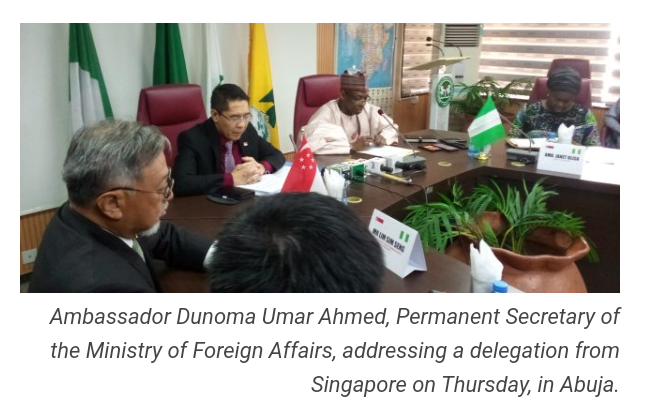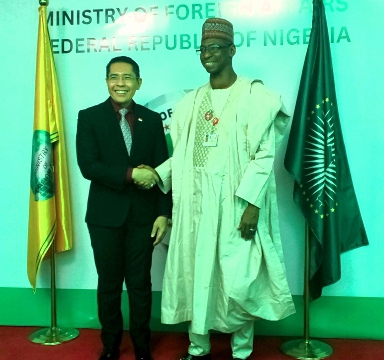Nigeria And Singapore Strengthen Economic Ties To Boost Non-Oil Revenue.
The Federal Government of Nigeria is intensifying efforts to diversify its economy by fostering collaboration with Singapore. This partnership, aimed at boosting non-oil revenue and economic growth, was a key topic during discussions led by the Ministry of Foreign Affairs in Abuja.
Ambassador Dunoma Umar Ahmed, Permanent Secretary of the Ministry of Foreign Affairs, welcomed a Singaporean delegation on Thursday, highlighting the significance of the relationship between the two nations.
“The main focus of our meeting is to underscore the importance of the relationship between us. We are working towards elevating our relationship and enhancing existing collaboration and cooperation,” Ahmed stated.

Progress in Non-Oil Revenue
Nigeria’s non-oil exports in the first half of 2024 reached $2.7 billion, marking a 6.26% increase compared to $2.53 billion in the same period last year. This growth underscores the government’s commitment to diversifying the economy and reducing dependence on oil.
Ahmed praised Singaporean companies operating in Nigeria for their contributions to job creation and GDP growth, encouraging further investments in sectors such as mining, agriculture, and renewable energy.
“Nigeria is now a good business destination with an enabling environment that will accommodate many Singaporean companies,” Ahmed asserted.
Capacity Building and Bilateral Agreements
The Nigerian government expressed appreciation for Singapore’s capacity-building initiatives, which have benefited around 700 Nigerian officials. Ahmed also revealed that Nigeria had submitted a draft Memorandum of Understanding (MoU) on Technical Vocational Educational Training (TVET) to Singapore, emphasising its potential to benefit both nations.
Dr. Maliki Osman, a minister in Singapore’s Prime Minister’s Office and leader of the delegation, highlighted the longstanding economic relationship between the two countries. He noted that Singaporean companies have invested over $4.5 billion in Nigeria across sectors such as agribusiness, oil and gas, transport, and infrastructure.
Existing agreements, including the Nigeria-Singapore Bilateral Investment Treaty and the Singapore-Nigeria Air Services Agreement, were acknowledged as pivotal to fostering trade and investment.
FUTURE OPPORTUNITIES
Osman recognised Nigeria’s youthful population, with a median age of 17, as a significant asset for manpower development. He emphasised Singapore’s willingness to share its expertise in transitioning from a resource-scarce to a knowledge-driven economy.
The delegation also discussed opportunities in emerging sectors such as ICT, artificial intelligence, and renewable energy. “We want to create more economic engagements in these frontiers, working closely together despite the global economic challenges we face,” Osman concluded.
This strengthened partnership between Nigeria and Singapore signals a promising pathway for economic diversification, capacity building, and enhanced bilateral relations.


